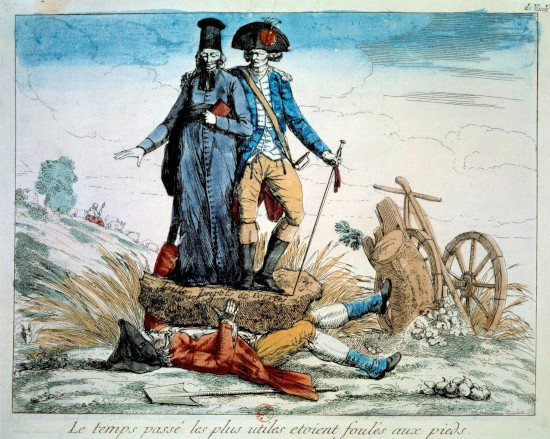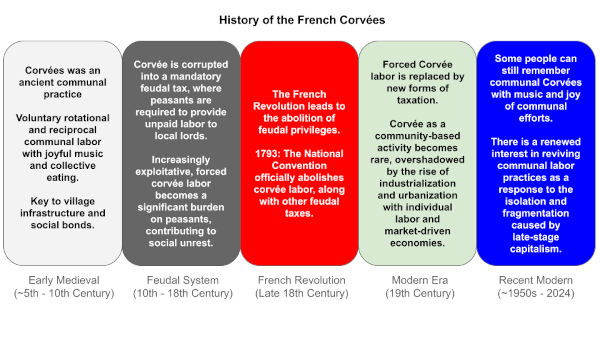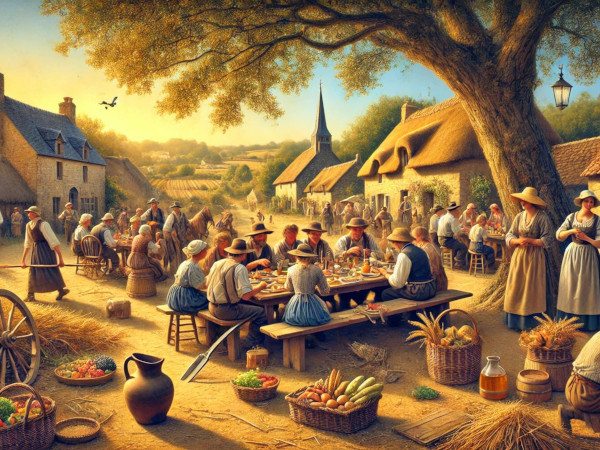Every culture has its traditions of mutual aid and financial support. Talk to older Caribbeans or Indians and they’ll tell you about pardner schemes or kitty parties, and there are Mwerya in Kenya. It’s a very natural thing for humans to do. It’s inherent in the human psyche. Capitalism is an unnatural blip in human history, that will soon be removed, either by humans or by nature (let’s hope it’s by humans). Here, Will Ruddick of Grassroots Economics (interviewed here) talks about the French tradition of Corvées:
As I travel through France with daughter and partner Aude Peronne we’ve had the privilege of speaking with Aude’s family in rural Normandy who can remember communal practices they called Corvées that sound just like the traditions we see around us in Kenya. What is amazing about Corvées in France is that the history is well documented (vs the purely oral traditions in Kenya)- so we’ve had the pleasure of bringing that out here in this article.
Imagine families, teenagers, and adults gathered together, laughing and working harmoniously. The joy of shared labor fills the air as they eat, drink, and sing, building bonds that transcend the task at hand. This scene captures the essence of communal Corvées, an ancient traditional practice in what is now called France, where neighbors assist each other reciprocally with farming tasks in a spirit of mutual aid. Corvées were not just about getting work done; they were about reinforcing community ties and ensuring collective well-being.
Latin Origins: The term “corvée” derives from the Medieval Latin word “corrogata”, meaning “a day’s work”. The root word “corrogare” combines “co-” (together) and “rogare” (to ask or request), literally translating to “to gather or request together”. This reflects the ancient concept of corvée as a communal activity where people were called to gather to perform labour for the common good.
Corvées originated before medieval France (we don’t know how far back they go!) as a voluntary system of communal labour where villagers would come together to support each other reciprocally with essential farming tasks and infrastructure projects. This ancient practice was rooted in mutual service, fostering social bonds and ensuring that no single family or individual was left to manage heavy labour alone. It played a vital role in maintaining the community’s agricultural productivity and social cohesion, creating a sense of unity and shared purpose among neighbours.

As feudalism took hold between the 10th and 17th centuries, the nature of Corvées shifted dramatically from a voluntary community practice to a compulsory tax imposed by feudal lords. This feudal corvée required peasants to perform unpaid labour on the lands of their lords under threat of punishment. This transformation represented a significant exploitation of the original communal spirit of Corvées, turning it into a tool for economic extraction and control by the ruling elite. The burdensome nature of forced corvée labour contributed to widespread resentment among the peasantry, fueling discontent that would later ignite revolutionary fervour.
The French Revolution marked a pivotal moment for forced Corvées, with the abolition of feudal dues and the corvée tax being among the key reforms enacted by the National Convention in the late 18th century. This abolition sought to dismantle the oppressive structures of the feudal system and address the grievances of the peasantry – yet brought only new forms of taxation, industrialization and isolation of ‘workers’.
Corvées were more than a means to manage farm labour; they were a core part of the social infrastructure. These gatherings built trust, facilitated the construction of essential community structures like churches, and strengthened bonds among neighbours. As mechanization and capitalism took over, communities became more efficient at producing goods for the market but at the cost of losing their communal spirit.
The consequences of this shift are evident today. The isolation of modern farming has contributed to a rise in farmer suicides and a decline in social cohesion. It raises the critical question: how many more suicides, how much more environmental degradation, must occur before we recognize that our lives should not solely revolve around economic production? We must recognize how our communal structures were destroyed (even how the concept of Corvées was corrupted, redefined and then outlawed) and revive our social infrastructures to address these crises, for they are symptoms of a deeper loss of community and support.
Today, there is a growing interest in reviving the communal essence of Corvées through modern frameworks like commitment pooling, aiming to restore the social infrastructure and community spirit that once thrived through these ancient practices.
Reviving Corvées in contemporary France requires a reintroduction of the social infrastructures we have lost, akin to reviving a lost language. This is where Commitment Pooling comes in—a modern interpretation that can reintegrate communal support systems into our lives. Commitment Pooling is a protocol developed to curate and value services we hold dear, enabling communities to express and exchange commitments in a structured manner. This system involves the following steps:
- Curation of Services: Identifying and organizing valuable community services.
- Relative Valuation: Establishing the relative value of different services.
- Commitment Expressions: Formalizing commitments to these services.
- Exchange Mechanism: Facilitating the exchange of these commitments with limits to ensure accountability.
By holding and exchanging commitments, communities can manage resources and support one another in a manner reminiscent of traditional communal Corvées. While the protocol covers the accounting and awareness of credit and debt, it also gives room for fun, skill-sharing, and trust-building that characterized communal Corvées.

The Vision for Modern Corvées
In this envisioned modern Corvées system, each business or individual expresses their commitment to their own services through formalized vouchers or subscriptions (like a bus ticket). These functions are legally similar to gift cards or loyalty points. Stewards (often called liquidity investors) curate portfolios of these vouchers, guaranteeing their quality. People could purchase these curated vouchers, use them for services, or exchange them for others of equal value within the curated pool.
This system, operational in its beta phase on platforms like Sarafu.Network, aims to facilitate a return to community-based resource management. User-facing native apps are in development to make this process more accessible, with releases planned for Android and iPhone in the coming year.
Corvées: A Universal Practice
It’s important to note that Corvées are not unique to France. Similar practices of communal labor and resource pooling can be found in cultures worldwide. These traditions are part of the living memories of our elders, and preserving them is as vital as protecting endangered species. The loss of these practices represents a profound loss of cultural heritage and social infrastructures, and their revival is essential for restoring the social fabric of communities.
As we stand at the crossroads of tradition and modernity, embracing the principles of Corvées through Commitment Pooling offers a pathway to rebuild our communities. This modern interpretation not only honours our heritage but also addresses contemporary challenges, fostering a resilient and interconnected society.
Join us in this mission to restore communal support systems and social infrastructure. Your engagement and support are crucial in bringing this vision to life, ensuring that we don’t just survive, but thrive together as a community.
This article draws inspiration from traditional practices and modern initiatives like the Commitment Pooling protocol by Grassroots Economics Foundation, which integrates ancestral wisdom with contemporary technology to foster community well-being.


Leave a Reply